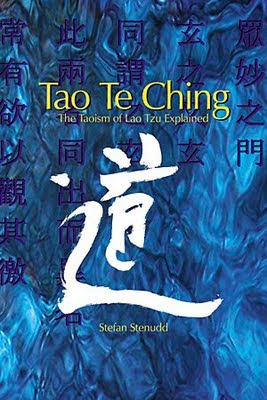Working on my English version of the Tao Te Ching, I speculated on the age old questions about the identity of the old man said to be the writer of the text. An intriguing possibility gnawed on my mind – what if the old man was in fact a woman?
Tao Te Ching, the classic on Taoism, repeatedly expresses preference of the traits traditionally linked to the female – such as humility, care, and yielding instead of struggling to take the lead. This was quite unusual in China at the time of the text's appearance, which would be somewhere during the 6th to the 4th century BC.
Legend has it that the writer was Lao Tzu, a man who had worked as a civil servant at the court of the emperor. When he got old, he left the court and the country, riding a water buffalo. A border guard convinced him to write down his wisdom, before leaving the country for good. This he did, and the result is the Tao Te Ching.
Nothing is known for sure about the man. Lao Tzu simply means Old Master, as if his own name didn't matter. Some annals claim that he was an older contemporary of Confucius, but that can be discussed. Many modern scholars doubt that he existed at all. They believe that the Tao Te Ching is just a collections of proverbs and such.
The title Lao Tzu, Old Master, might also be plural – the Old Masters. That would argue for the book being a collection of proverbs from here and there in Chinese tradition. The title also lacks gender specification. The Old Master might just as well be a woman.
Many historians and other experts on ancient China would object that a female author of this or any other classic is highly unlikely. Maybe so, but definitely not impossible. We probably have no way of knowing for sure, but I like the idea.
There is something about the mildness of the Taoist philosophy, the compassion of the Taoist ideals, and the soft words by which they are expressed in the Tao Te Ching, that suggest a female writer. Men in those days, mostly also today, have had a tendency to proclaim their wisdom much more firmly, announcing it proudly. They usually reason and argue quite categorically, without any hesitation.
Certainly, there's nothing ruling out a male writer of the Tao Te Ching, either. Most writers up until the last couple of centuries have been male, in every part of the world. But not all of them. This could be one exception.
In any case, the Tao Te Ching is surprisingly soft-spoken and pensive, for a classic that has become one of the most prominent texts of ancient wisdom. Whether male or female, we should all be more like Lao Tzu.
Here is more about my English version of the book:
Tao Te Ching – The Taoism of Lao Tzu Explained
Here is the book on Amazon:
Tao Te Ching on Amazon
It's also a Kindle ebook:
Tao Te Ching – Kindle ebook
If you're Swedish, it's quicker and cheaper to order the book from
AdLibris.




